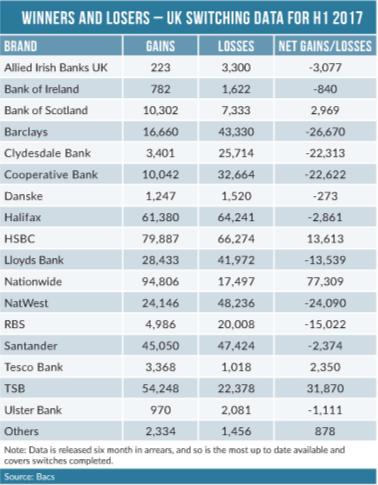The latest figures for the UK’s Current Account Switch Service (CASS) are out, and if you focus on total switches since the service launched in 2013, everything in the garden is rosy.
A total of 4.45 million successful switches have taken place since 2013. Dig a little deeper and the picture is less positive. Since year one of the service, there has been a year-on year decline in customers switching their main current account. Total switches in 2017 amounted to 931,956, down a whopping 8% from 1,010,423 in 2016. Even worse: the rate of decline in total switches has increased. The figure for 2016 represented a decline of 2.3% from the 1,033,939 switches in 2015. In 2014, there were 1,156,838 switches.
Despite the banks’ success in administering 7 day switching – the service enjoyed a satisfaction rate of 93% in the fourth quarter of 2017 – present switching rates are less than they were in 2012 before the service launched, when 1.12 million switches took place.
The disappointing figures coincide with record levels of public awareness of the service. Awareness hit a new high of 84% in October 2017 following the launch of high-profile public awareness campaigns that helped the service record the largest number of switches in November 2017 (110,774) since March 2016.
Winners and losers: take a bow Nationwide and TSB.
Switching data across the banking brands is released by Bacs six months in arrears, and so the most up-to-date available figures cover switches completed up to 30 June 2017.
In the first half of 2017 two brands stand out as clear switching winners: Nationwide and TSB. Nationwide enjoyed a net gain of over 77,000 customers in the six months to end June, with TSB up by almost net 32,000 customers (see table).

US Tariffs are shifting - will you react or anticipate?
Don’t let policy changes catch you off guard. Stay proactive with real-time data and expert analysis.
By GlobalDataOf the traditional so-called incumbents, HSBC was the only brand to show an overall net gain. By brand, Barclays was the biggest loser with a net loss of over 26,000 customers; by banking group RBS (including NatWest and Ulster) lost a net total in excess of 40,000 customers.

And about time too
As RBI goes to print comes the welcome news that UK regulator The Financial Conduct Authority will publish the controversial report into how RBS’s infamous Global Restructuring Group (GRG) treated SME customers.
In a painfully embarrassing session before the UK Parliament’s Treasury Select Committee, RBS CEO Ross McEwan said RBS would not seek to prevent the FCA releasing the report. Do not, however, hold your breath. The FCA will now contact all the individuals identified in the report and ask for their consent to publish. RBS has been in denial for years about the damage its GRG unit inflicted not just on customers but on the reputation of UK banking. Do not be surprised if both chair and CEO have long since moved on by the time the full report is published by the FCA.
The GRG action group, a body representing hundreds of business alleging that they were placed into financial distress by GRG, said: “We welcome the FCA’s agreement to publish the report in full, a move we have consistently called for. It is just a pity that GRG’s victims have had to wait for so long, thanks to the pointless intransigence of RBS and the regulator.”
On the last point, it is hard to disagree.








